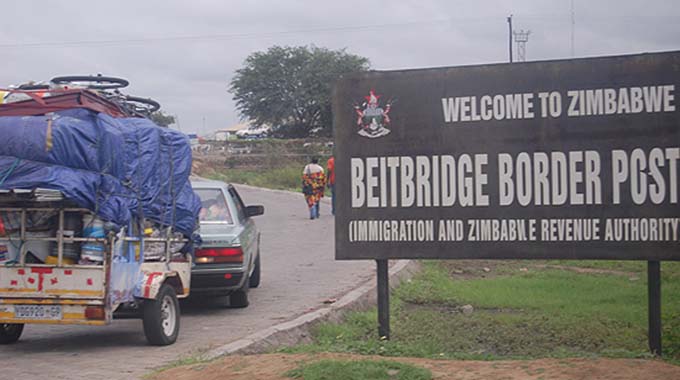Border modernisation to boost fight against crime

Thupeyo Muleya
Beitbridge Bureau
THE ongoing modernisation of the Beitbridge border post will help improve the capacity of security agencies to fight crime, especially the smuggling of drugs and related products in and out of Zimbabwe, a senior official has said.
The Government and Zimborders Consortium are transforming the country’s busiest inland port for US$300 million under a 17,5 year concession to Built, Operate and Transfer.
Chairperson of the inter-ministerial team on drugs and substance abuse, responsible for the supply reduction pillar, Superintendent Michael Chibaya, said the automation of services was a welcome development.
The team visited Beitbridge Border Post yesterday to check the capacity and readiness of officials in suppressing the supply chain of drugs and narcotics at the port of entry.
Supt Chibaya said the separation of traffic, and partitioning of border terminals for freight, buses and light motor vehicles would enhance their capacity to handle issues related to narcotics and drugs.
“From a security point of view, we are seeing this modernisation as a step in the right direction by our Government.
“You will note that the security systems are being upgraded and more hitech equipment like metal detectors and commercial truck scanners are being installed with closed circuit television.
“We will not be dealing with the problem of drugs inland in Zimbabwe without reducing or suffocating traffic at this major port of entry and exit”.
He said a lot of drugs were finding their way into Zimbabwe through the formal ports of entry and exit, and across illegal crossing points.
Task forces were assessing the state of affairs at the borders and making strategic corrective measures to minimise the smuggling of drugs which had become a grave concern in the country considering their devastating effects on the youths.
“We need to curtail this drugs scourge and from what we are seeing on the ground at Beitbridge, we are on the right track to achieve our target on border-related crimes.
“It is important to note that the separation of traffic and reduction of the human interface will help reduce crime and corruption in general.
“Ideally, issues of accountability will improve because we will be able to tell who was at what point within the border when a crime occurs,” said Supt Chibaya.
He said the inter-ministerial team was carrying out a strategic assessment across all 10 provinces on the capacity of authorities in those areas to deal with drugs.
More training of border officials and the deployment of specialised manpower at restricted places was a key enabler in enforcing drug laws.
The officer-in-charge drugs and narcotics unit in Beitbridge, Detective Assistant Inspector Manuel Mbaraja, said the most common abused drugs around the area were BronCleer and Benylin cough syrups, crystal meth (mutoriro) and mbanje coming in from eSwatini via South Africa.
“Although at times, we have the names of the possible or suspected drug peddlers, it is hard for the police to bring these people to book because of how they operate.
“They use people of low social status to push the products on the market and we continuously round them up. But these are small fish.
“We need continued support from everyone concerned so that we may be able to get the bigger players,” said Det Asst Insp Mbaraja.
In terms of smuggling, he said, the drugs were coming in small parcels in false compartments of commercial trucks.
Det Asst Insp Mbaraja said drugs, especially crystal-meth, were being smuggled in washing powder or powdered milk packages or were concealed in shoes.
The Ministry of Health and Child Care focal person on mental health in Beitbridge, Sister Juliana Karenyi, said between January and April this year, they had handled 114 cases of mental disorder.
“Nine of these were related to drugs and substance abuse and by any standard this is worrisome. So we need to work together as communities to end this scourge,” she said.
Anti-drugs abuse activist Mr Kudakwashae Garaipasi said there was a need to construct a rehabilitation centre for drug abusers in the border town.
With more people being rehabilitated, the supply and demand for such substances was likely to go down.










Comments